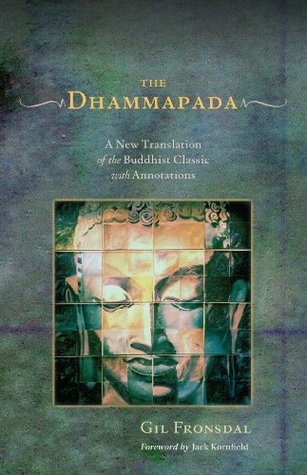More on this book
Community
Kindle Notes & Highlights
First, Nirvana may be indescribable in terms of our experience and language. Second, the experience of the ultimate may not be one thing. Rather, it may be like the condition of prisoners released from prison: each ex-prisoner shares the same freedom from incarceration, but the individual prisoners may vary widely in how they live with that freedom.
Many do not realize that We here must die. For those who realize this, Quarrels end.
One who recites many teachings But, being negligent, doesn’t act accordingly, Like a cowherd counting others’ cows, Does not attain the benefits of the contemplative life.
Do not consider the faults of others Or what they have or haven’t done. Consider rather What you yourself have or haven’t done.
Like a beautiful flower, Brightly colored but lacking scent, So are well-spoken words Fruitless when not carried
Greater in combat Than a person who conquers A thousand times a thousand people Is the person who conquers herself.
If, desiring happiness, You do not use violence To harm living beings who desire happiness, You will find happiness after death.
Even though well adorned, If one lives at peace, Calmed, controlled, assured, and chaste, Having given up violence toward all beings, Then one is a brahmin, a renunciant, a monastic.
As one instructs others, So should one do oneself: Only the self-controlled should restrain others. Truly, it’s hard to restrain oneself.
By oneself alone is one purified. Purity and impurity depend on oneself; No one can purify another.
Don’t give up your own welfare For the sake of others’ welfare, however great. Clearly know your own welfare And be intent on the highest good.
Like a trapeze artist, we must balance ourselves before we try to balance others. We must maintain our own equipoise (inner balance) at all times; otherwise, we cannot be of much help to others. This is not a selfish teaching because as the last line says, we should remain intent on the highest good— for ourselves and others. However, in order to bring spiritual Awakening to our friends and family, we must first Awaken.
Don’t be engrossed in the world.
Whoever recovers from doing evil By doing something wholesome Illuminates the world Like the moon set free from a cloud.
This verse highlights one of the most misunderstood points of karma in Buddhist doctrine: there is room to make things right and spare ourselves the consequences of previous misdeeds. We cannot ask, however, that the consequences of previous actions simply disappear or be avoided.
Even the gods envy The awakened ones, The mindful ones, The wise ones Who are intent on meditation And delight in the peace of renunciation.
Doing no evil, Engaging in what’s skillful, And purifying one’s mind: This is the teaching of the buddhas.
Patient endurance is the supreme austerity.
There is no fire like lust, No misfortune like hate, No suffering like the aggregates, And no happiness higher than peace.
Tasting the flavor Of solitude and peace, One becomes free of distress and evil, Drinking the flavor of Dharma joy.
The merit we have made Receives us, As a family does the return of a beloved relative.
People are enamored with obsessive thoughts; Tathāgatas are free of obsessive thinking.
Having given up violence Toward beings both timid and strong, Whoever neither kills nor causes others to kill, I call a brahmin.
A Brahmin in Indian society was a person of the highest caste. The brahmins claimed that only they could be purified. The Buddha subverts that language and insists that one is a brahmin, or purified one, based on one's actions. This verse reminds us that compassion is at the heart of the Buddha's teaching.


